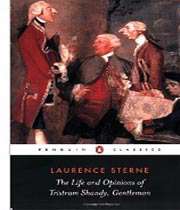The Life and Opinions of Tristram Shandy, Gentleman (1759-1767)
by Laurence Sterne

In the words of Steve Coogan (playing himself playing Tristram Shandy in Michael Winterbottom’s film version of Sterne’s seemingly unfilmable novel), Tristram Shandy is “a post-modern classic before there was any modernism to be post- about.” Sterne’s 1759 masterpiece is an anachronism—a case of modern, even post-modern, literary sensibility springing up almost two hundred years before either aesthetic became widespread. The difficulty of the book is primarily structural: the novel’s jumbled, non-linear chronology is frequently interrupted by hero/narrator Tristram’s taste for digressions, pre-history, and recounting the doings of minor characters instead of his own life story (he does not get around to narrating his own birth until the third volume of the novel). Tristram patches into his text seemingly unrelated tales, letters, and images as he pleases, and (maddeningly) begins recounting events only to stop short of their denouement (a sort of writerly/readerly coitus interruptus). Some readers just don’t enjoy the novel’s intense consciousness of the chaos of real “life and opinions” and the near-impossibility of representing them accurately in literary form (Samuel Johnson, for one: “Nothing odd will do long. Tristram Shandy did not last.”). Sterne’s artful literary approximation of the associative, digressive messiness that is the real mode of human thinking and life plots, his attention to the difference between real time and narrative time, and his constant attention to the author’s determinative and problematic role in the story he tells, are not for everyone. But for those willing to mount their hobbyhorses and give TS a go, I recommend watching Winterbottom’s film (a movie about making a movie about a book about writing a book) as a warm-up. Also, as one of our readers testified in the introductory post for this series, “Tristram Shandy is laugh aloud funny. I picked it up a few years ago with no prior knowledge–just wanted a novel from the eighteenth century. It’s a real treat. At one point, Sterne gets 8 pp. out of a piping hot chestnut falling into a guy’s breeches. This is lofty stuff.”
Source: themillions.com